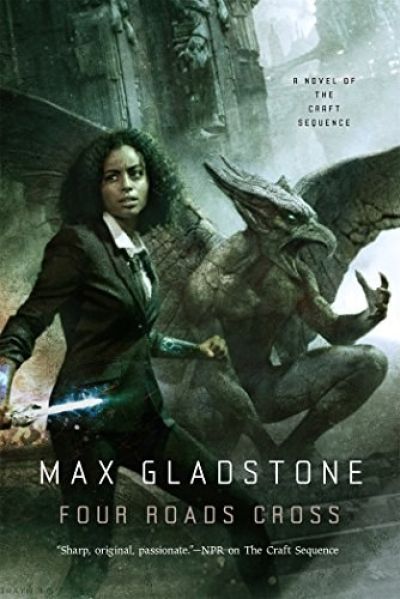Marching As To War
Four Roads Cross (Craft Sequence, volume 5)
By Max Gladstone

30 Oct, 2017
0 comments
Four Roads Cross is the fifth book published in Max Gladstone’s Craft sequence. It is the fourth book by internal chronology.
Many in Alt Coulumb believe that Seril the Moon Goddess betrayed them when she left the city to fight and die in the God Wars. Seril has revived and returned, sans publicity. She helps her people where she can do so without revealing herself. The city’s priests know, but are still considering how best to handle Seril’s reappearance.
When Seril dispatches one of her gargoyles to save a woman from muggers, the victim turns out to be one of Alt Coulumb’s Criers, the local equivalent of a plucky reporter. Being saved from a brutal death is one thing, but a story is a story. The world will learn the goddess walks again.
Journalistic diligence may have doomed a city.
Some in Alt Coulumb welcome their lost goddess back. Others cannot forgive her for abandoning them for the God Wars. The god Kos the Everburning, himself returned from a brief death the previous year, welcomes his lost companion. That’s touching for fans of divine romance, but extremely alarming for the world’s financiers.
Because Kos sat out the God Wars, Alt Coulumb is one of the few god-run cities left in the world. Long-term stability has turned it into an important centre of international banking. But stability and solvency are threatened by Kos’ insistence on defending Seril. To investors, that looks like an enormous, previously undisclosed liability. Rather than risk a massive collapse in global markets, they are contemplating a hostile takeover of the city.
Craft worker Tara Abernathy has known that the crisis was coming ever since she played a role in Seril’s return. She could have let her city to deal with the problem on its own. Knowing that the likely outcome is that Alt Coulumb will be crushed beneath the forces of economic rationality, she turned down promotion and relocation to take her part in what is an almost certainly futile attempt to save Alt Coulumb and its gods from the rapacious investors.
No brilliant, elegant solution having presented itself, Tara and her allies have no choice but to try a desperate strategy. The city’s would-be conquerors have foreseen this. In fact, they are counting on it.
~oOo~
One of the minor side-effects of the God Wars is that divine magic, which is sustainable over millennia or longer, has been replaced by wizardly Craft. Craft treats the world as a gigantic pile of finite resources, to be stripped and turned into wealth for as long as it takes to render the planet lifeless1. This may seem a bit short-sighted, but at least one Craft worker has a cunning plan to deal with the eventual extinction of base stocks: colonize other worlds. Nice to see “We’ve used up this Earth; time to find another,” has its parallels in other universes.
The global finance system may seem inhumane and cruel. In its defence, that is an illusion caused by the fact it is run by liches like the King in Red. Also by would-be liches who cheerfully use lesser beings as fuel in their schemes, whilst assuring themselves it’s all for the greater good. It’s not that they’re being mean for the sake of being mean — well, the King in Red is but only because he is spiteful and still consumed by an ancient grudge — it’s just that grinding the little people underfoot is the most efficient path to personal wealth and power.
Some readers may want to read parallels into the behavior of the Craft workers and real world business folk, not to mention between the “strip the world dead, find a new world, repeat” and our space cadets (not to mention the demons who keep popping up to eat the world and our current economic system). This would be a profound error. If there’s one universal truth, it’s that speculative fiction is pure escapism; the similarities between insatiable, amoral monsters and the antagonists in this book are probably just coincidental.
Thanks to the nature of Gladstone’s world, his financial and legal procedural features not just brilliant legal gambits, but also displays of eldritch power, whirling displays of martial prowess, cosmic threats, as well as tragedy (and whatever the opposite is of tragedy) at a personal level. I cannot be the only person to set down a Perry Mason book thinking it needed more spell-casting, wuxia, and a scene where Perry punched Cthulhu in the nose. I did not think anything similar about Four Roads Cross. It has it all.
Four Roads Cross is available here (Amazon) and here (Chapters-Indigo).
1: Possibly sooner rather than later, because the Craft workers don’t always look carefully at the resources they want to strip to see if perhaps they formed part of an immense defensive structure that’s still in use.
